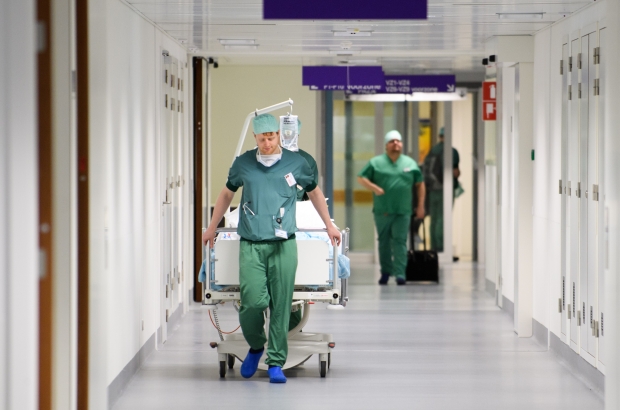- Daily & Weekly newsletters
- Buy & download The Bulletin
- Comment on our articles
Brussels hospitals overwhelmed amid spike in winter viruses
As winter viruses run their course, emergency wards in Brussels are urging sick patients to turn to their general practitioners first before putting pressure on a hospital system that is already struggling to cope with the surge.
In Brussels, hospitals are finding their emergency intake rooms increasingly overwhelmed by patients with only minor illnesses and ailments.
The situation has become critical enough that authorities have launched an appeal to the population asking people to seek a consultation with their GP or a clinic before seeking help from a hospital.
But as Didier Delmarcelle, head of the emergency department at the Cliniques Saint-Jean in the centre of Brussels, explained, “many people do not have a GP in the Brussels region”.
Furthermore, the availability of GPs is likewise strained for the same reasons.
“There is also a societal notion of urgency,” said Delmarcelle. “People have a growing sense of urgency, of wanting to be listened to quickly, whether the reasons are justified or not.”
But having a regular GP is key to keeping hospitals from overcrowding, in addition to securing optimal levels of care. A GP knows their patients’ medical history and can therefore make decisions with better context.
When arriving at a hospital, on the other hand, a patient is likely to be seeing a new doctor for the very first time.
Apart from seeing their GP, patients are encouraged to seek help from a polyclinic before dropping by an emergency room.
A polyclinic, such as the one recently opened in Cliniques Saint-Jean, is a medical, surgical and technical care service that offers more than 20 different medical specialities and allows 400,000 consultations per year, according to general manager Alexandre Duschuymere.
These clinics make appointments via a call centre, website or medical secretary, which eases the burden on both GPs and hospitals – something hospitals say is greatly needed.
At Charleroi hospital, one of the largest in Wallonia, the occupation of intensive care beds coupled with the lack of staff is becoming cause for concern.
“Sometimes it's very complicated because we almost have to put bunk beds in the intensive care unit or discharge patients a bit hastily,” said Manfredi Ventura, medical director of the Charleroi hospital.
“Even if these are serious interventions that cannot be postponed too much, we are sometimes obliged to postpone them by a week or a few days because on the scheduled day we cannot guarantee that the intervention will be done in the best conditions for our patients.”
The same is true elsewhere, such as at the CHC of Liège.
“Some heavier interventions require a passage of one or two days in intensive care, but we have had beds closed for several months due to a shortage of nurses, so we are forced to smooth out the activity,” said medical director Yannick Neybuch.
“This means that we set the number of patients we can take who will need intensive care after their operation and we postpone the extra ones to the following week, but this is only for a maximum of one or two weeks for less serious pathologies and patients who can wait.”
Surgical operations for more pressing conditions, such as cancer, will not be postponed.
“So there is a certain degree of prioritisation with delays but they are relatively short,” Neybuch explained.
For now, hospitals are managing to take care of all patients within a reasonable timeframe, but in order for the healthcare workers to continue providing care with less stress, they say a revaluation of the sector is needed, along with more beds.
A recent audit of hospitals found that “for most disciplines, the cumulative number of unperformed care services in May 2022 was between 12 and 24% of their normal annual activity”.
This is a result of the pandemic, along with a lack of staff and beds.
In 2020, the drop in the number of surgical services during the first Covid wave was striking. In the first wave (April 2020) only 5.7% of non-essential surgical services were performed. Things have improved since then, the audit says, but not enough.
Despite several catch-ups between the different waves, still to this day operations are postponed, in particular in the case of vascular surgery and heart transplants, for example.
Pneumology and geriatrics are also lagging behind, though the report notes a significant rate of catching up in oncology and in anti-cancer treatments.
The audit notes a remaining delay in the provision of psychiatric care. This is due to the constant pressure on hospitals, the lack of beds and also high turnover of staff.
“At the beginning of 2022, only one hospital out of three was operating at full capacity in Belgium,” the report reads.
“We note that a neighbouring country such as the Netherlands is facing the same problem of significantly increased absenteeism, with only one in four hospitals operating at full capacity at the beginning of 2022.”
Staff shortages alone are now responsible for the closure of 10% of intensive care unit beds, and the audit recommends five ways to improve the situation: real time data monitoring, reducing the workload for nurses, reducing the workload for doctors, matching patient demand with added value and reducing the use of certain services by stricter indication.

















